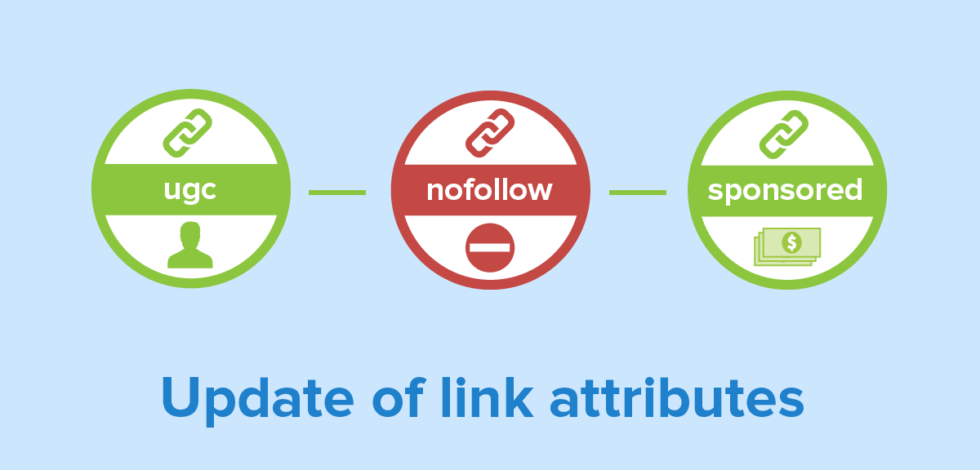On Tuesday, 10th September Google announced that they were making changes to link attributes, this comes 15 years after they first introduced the rel=”nofollow” link attribute.
So what are these new attributes?
- rel=” sponsored” – this will be used to identify paid links, whether that’s for ads, sponsorships or any other sort of compensation.
- rel=’ugc’ – This stands for “user generated content”, and this is recommended for use for links in user generated content, e.g. comments!
Google is changing rel=”nofollow” to a ‘hint’
For rel=’sponsored’ and rel=’UGC’ Google will consider these as hints from the day it was introduced (the 10th of September), meaning they may follow these links still, to understand what the link is about, the content that it links to etc!
The same will also be happening with rel=’nofollow’ links from March 2020.
What Google has recommended:
Google has said any sites already using nofollow links do not need to change links already in place for content they do not want to affiliate themselves with etc, but in the future to consider using the rel=”sponsored” for any paid/ compensated link schemes, in order to avoid a manual penalty.
They have also said that you can use more than one link attribute at once; for example, rel=”ugc sponsored” for sponsored content within the comments.
They also claim that if you use the wrong attribute it won’t really have any negative effect, even if you use the rel=sponsored by mistake, they may just not count the link as any sort of credit to the page it links out to at worst.
Why has Google done this?
Google has indicated that this update to the link attributes was necessary to gain more information on link data because so many big sites will just nofollow all their outbound links, which inhibits Google’s ability to gain data.
Sites such as Wikipedia found it hard to control all the hundreds of thousands of links on their site, so it was easier for them to just ‘nofollow’ them all in order to avoid any penalties!
This was the response given by Gary Illyes when asked:
“Is Google’s motivation for this change because Google wants to strengthen the link signal in order to get better search results?” by Roger Monti of SEJ.
The response was:
“Yes. They had been missing important data that links had, due to nofollow. They can provide better search results now that they consider rel=nofollowed links into consideration.”
He also asked whether Wikipedia outbound links will still be considered nofollow, considering they offer such a wealth of information often?
Interestingly Gary Illyes responded with this:
“It would be possible to ignore nofollowed links on Wikipedia. But it’s still uncertain how and when to ignore them. That said, they’re preparing prevention to protect against the abuse.”
This means that many links on Wikipedia may pass on authority, where Google thinks it is necessary!
It seems to us that Google want to specify they will only treat rel=nofollow, rel=ugc or rel=sponsored as a ‘hint’ because it gives them a chance to gain more data, and what does Google love more than anything? Data!
This is what Google said in its Webmasters blog:
“Links contain valuable information that can help us improve search, such as how the words within links describe content they point at. Looking at all the links we encounter can also help us better understand unnatural linking patterns. By shifting to a hint model, we no longer lose this important information, while still allowing site owners to indicate that some links shouldn’t be given the weight of a first-party endorsement.”
We’ve always believed that nofollow links still pass on link juice anyway, just due to the fact that most sites using nofollow normally have high authority, and therefore even a nofollow link still shows confidence from a high authority site to another, but it seems that Google’s desire to gain more data on linking may actually help many sites gain more authority from their links from nofollow sites.
What does this mean for webmasters?
Well on a positive note it could mean many sites getting the authority they deserve from big sites that just use nofollow for everything! If Google chooses to ignore some of those ‘hints’ then it may help out sites that do have some bigger links, by increasing the ‘link juice’ passed on.
Many believe that big media sites always using ‘nofollow’ was unfair anyway, so could this equal the playing field a little?
On the other hand, we’re still struggling a little with this idea of the actual enforcement of the rules; is admitting sponsored links smart? We know that Google will struggle to tell when links are paid for or not, unless it is blatantly obvious. Google aren’t all-powerful and all-knowing, as much as we believe they are.
They claim that using rel=”sponsored” will ensure that the site linking out won’t receive a manual penalty, but it doesn’t actually make any comment on how Google will rank pages that use a lot of rel=”sponsored”, will they view them as less trustworthy? Will they view the site getting the sponsored link as less trustworthy?
Many sites that charge for links do not ‘nofollow’ them, and 99% of sites don’t receive manual penalties unless they’re really engaging in shady behaviour, so why would they now use this sponsored attribute?
It seems like it may just be a way for Google to go fishing for more data. Realistically they don’t know how this is going to play out, it seems that Google may be chucking these new attributes out there to see what they get back.
Of course, if it’s clear a blog post/ article etc has been paid for or sponsored then adding rel=”sponsored” will be useful, as that will be clear within the content that it is an advert or sponsored.
Most bloggers already have to be clear, especially in the UK when they’re doing sponsored content, as you can see with this example below:
Overall this is a pretty big change and people in the SEO community should be talking more about it, probably the biggest change is the fact Google will now be able to decide whether a link is followed or not. This could really help out some sites that will have the link juice flowing to their sites suppressed by the nofollow link attribute.
But at the same time it’s a smart way for Google to harvest more data, and see who will actually mark their links as sponsored! And also with the lack of real information on why it’s beneficial for sites to use sponsored over no follow, will anyone bother making the change?
Only time will tell what effect it will have!

